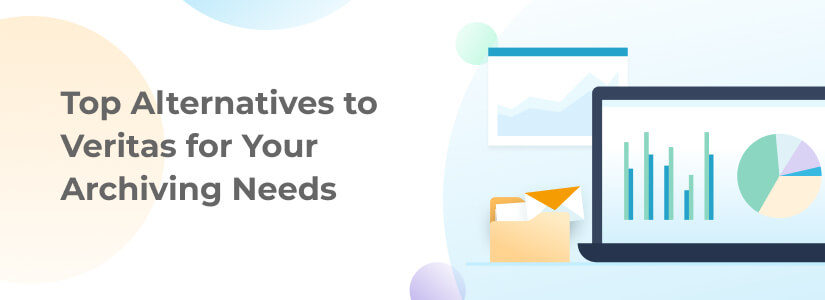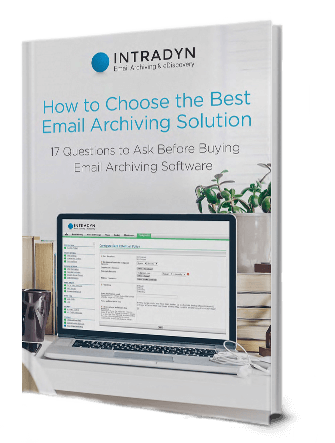Data Management Made Easy: 6 Alternatives to Veritas

Veritas (formerly Symantec) has long been a prominent player in the electronic communications archiving industry, with its Enterprise Vault platform. While users have praised its extensive storage and ease of use, they’ve also raised concerns about the solution’s maintenance demands, backup bottlenecks and subpar data classification for eDiscovery purposes. Coupled with a reported dissatisfaction with customer service, these challenges have prompted many organizations to search for Veritas Enterprise Vault alternatives to enhance efficiency and streamline their archiving process.
We’ll explore some of those alternatives in this article, as well as offer insights into how to choose the right archiving platform for your organization.
What to Look for in an Enterprise Archiving Solution
Whether you want to make the switch from Enterprise Vault to a new archiving platform, or are looking into email archiving solutions for the very first time, here are some tips to help you start your search:
Features & Functionality
Naturally, you’ll want to ensure that any solution you invest in meets your organization’s requirements and streamlines the archiving process. There are some basic features and capabilities you should look for in any archiving solution, including support for a variety of content types and file formats, real-time capture, granular search, redaction and annotation tools and legal hold automation.
Some questions to ask prospective vendors:
- Does your platform support advanced search and retrieval features for efficient data access?
- How does your archiving solution handle different types of email content and file formats?
Security
Emails often contain classified or otherwise confidential company or customer information. To keep your data safe from prying eyes, it’s important that any archiving solution you choose has robust security capabilities.
Some questions to ask prospective vendors:
- What encryption methods do you use to secure archived data?
- Do you encrypt data in motion, at rest and in use?
- Does your platform support role-based access controls to restrict user permissions?
- Does your platform comply with data privacy standards?
Compatibility
To make archiving as efficient as possible, you’ll need to integrate your new solution with your existing email server, as well as any other relevant business applications.
Some questions to ask prospective vendors:
- Which email servers does your solution support?
- Does your solution natively integrate with any of the applications within my current ecosystem?
- Are there APIs available for integration with other business applications?
Cost
Although cost shouldn’t be your primary motivator when choosing an Enterprise Vault alternative, it’s still important that you get your money’s worth out of any solution you invest in. To do so, you need to understand your total cost of ownership and potential return on investment.
Some questions to ask prospective vendors:
- What is your pricing structure, and what is included within each pricing tier?
- Are there any additional costs for features or storage?
- How do you calculate the ROI of your solution?
Deployment Options
On-premise, cloud-based, virtual device and software as a service (SaaS) — there are quite a few deployment options to choose from depending on your organization’s needs and available resources. No matter which Enterprise Vault alternative you choose, it’s important that you find one that is compatible with your organization’s existing IT infrastructure.
Some questions to ask prospective vendors:
- Is the system compatible with our preferred deployment model?
- Does this system support hybrid deployment, if needed?
Ease of Use
You’ll want to keep your end-users — in this case, your employees — in mind when selecting an Enterprise Vault alternative. While some may have experience with highly technical IT systems, it’s more likely that your end-users will need a solution with a gentle learning curve.
Some questions to ask prospective vendors:
- How user-friendly is the system for both end-users and administrators?
- Can users easily access email archives from different devices?
- How easy is it for users to retrieve archived emails?
- What training resources do you offer?
Customer Support
Whether you’re experiencing issues with your archiving solution or simply need a bit of guidance, you need timely, responsive support to prevent any unnecessary downtime. The more ways you can access quality support and customer service — phone, live chat, knowledge base and more — the better.
Some questions to ask prospective vendors:
- What is your customer support model (e.g. self-service, assisted support, premium support tiers, etc.)?
- Are there defined service-level agreements for different levels of support?
- Do you offer onboarding assistance for new customers?
- What is your average response to support requests?
Scalability
As your organization grows, so will the volume of emails you need to archive. You need to make sure that your new archiving system is capable of growing with you and meeting your organization’s evolving storage needs over time.
Some questions to ask prospective vendors:
- What is the maximum storage capacity your platform can handle?
- How do you support capacity planning to accommodate increasing volumes of email data?
- How will your solution maintain fast and efficient data retrieval speeds, even as my volume of archived data increases?
6 Most Popular Veritas Enterprise Vault Alternatives
Let’s take a look at some of the most popular alternatives to Veritas Enterprise Vault email archiving on the market today, presented in alphabetical order.
Barracuda Message Archiver
Part of the Barracuda Archiving platform, Message Archiver is designed to simplify records storage and compliance management by automatically capturing and storing email communications. Notably, Message integrates with the Barracuda Cloud for secure, long-term storage and backup.
While Message Archiver earns points for its ease of implementation and custom retention policies, some users have noted that the folder structure of the mailbox can be challenging to maintain. Additionally, some users find the search function for non-email items, such as contacts, to be confusing.
| Notable Features | Pricing |
|
Pricing available upon request |
Google Vault
Google Vault is an advanced eDiscovery and archiving service for messaging and content generated through Google Workspace (formerly G Suite) applications. Google Vault is specifically engineered for Business and Enterprise editions, providing tools for data retention, search and export. This solution’s native integration with Google Workspace makes it a cost-effective option for those already using Google’s suite of productivity tools.
With that said, users have reported that Google Vault’s ability to export chats into different formats is in need of improvement. Exporting emails can also be time-consuming, especially for large volumes of data.
| Notable Features | Pricing |
|
See the Google Workspace website for the most up-to-date figures. |
Intradyn Email Archiver
The Intradyn Email Archiver is a comprehensive email archiving solution, catering to the needs of organizations both large and small in a variety of industries. Email Archiver addresses the complex challenges of regulatory compliance, eDiscovery, litigation and data management through an easy-to-use, highly scalable system that can be deployed in multiple environments, including cloud-based systems, virtual machines and on premise.
Email Archiver is highly regarded for its ability to capture, index and save all incoming and outgoing emails in real time; its granular search functionality, which includes wild, fuzzy and proximity searches; and its built-in legal hold and redaction tools.
See Intradyn in Action in Our Free Demo Video >>
| Notable Features | Pricing |
|
Pricing available upon request |
Mimecast Cloud Archive
Mimecast Cloud Archive is an archiving solution with data retention, search and retrieval functionality for emails, attachments and Microsoft Teams conversations. Much like many of the other Veritas Enterprise Vault alternatives on this list, Cloud Archive assists with compliance, eDiscovery and data management.
Cloud Archive has earned recognition for its cost-effectiveness and easy integration with multiple email servers; however, users have also said that its interface leaves something to be desired, and that transferring can be cumbersome.
| Notable Features | Pricing |
|
See the Mimecast website for the most up-to-date figures. |
Proofpoint Archive
Proofpoint Archive is a cloud-based archiving solution that supports a wide range of content types, including email. The system purports to offer a centralized, searchable repository that simplifies legal discovery, compliance and data management. Recognized for its security, scalability and flexibility, Proofpoint Archive supports fast and efficient searching across various content types. However, users have noted that Proofpoint’s customer support team can be slow to respond to requests and that the user interface is not as intuitive as it could be.
| Notable Features | Pricing |
|
Pricing available upon request |
Smarsh Email Archiving
Smarsh Email Archiving supports automatic data capture for a wide range of popular email servers, including Microsoft Exchange and Gmail. Smarsh Email Archiving captures emails in their native format, including all attachments, for comprehensive record-keeping. The solution also features advanced search to track down content and identity integration tools for managing profiles across communications. The platform has, however, earned low marks from users for its unresponsive customer support, lack of spam filtering and hidden costs.
| Notable Features | Pricing |
|
Pricing available upon request |
Discover the Email Archiving Solution That’s Right for You with This Free Guide >>
How to Migrate from Veritas Enterprise Vault
Ready to make the switch from Enterprise Vault archiving to one of the competitors shown here? Once you’ve carefully vetted and chosen a solution, the next is to migrate your existing email archiving onto your new platform.
We wrote an in-depth blog post on the subject, but here are a few basic pointers:
- Create a strategic roadmap that includes your purpose and goals, timeline, resource plan, budget and more.
- Review your company’s data retention policies prior to migration to ensure they still align with your organizational goals and needs.
- Review all applicable laws and regulations to ensure total compliance when transferring your existing archive.
- Review your archival data to ensure its integrity, cleansing data as needed.
- Back up your data prior to migration to prevent data loss.
- Test out your migration plan in a sandbox environment to identify any potential vulnerabilities and increase your chances of success.

